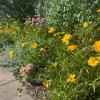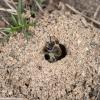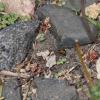2023 was another exciting year for invertebrate conservation, from launching new research to winning protections for public lands and endangered species. We even made what has to be the Xerces Society’s first ever appearance in a late night comedy sketch. Here’s a look back at some of our community’s favorite videos and stories in 2023.
Top posts
Monarch Caterpillar Transforming by Kailee Slusser, Web and Digital Communications Specialist, July 28, 2023
This incredible sequence was captured in the backyard of Xerces communications specialist Kailee Slusser, confirming that invertebrates are performing everyday miracles right outside our door, if we just know where to look. More than 1.3 million users on Facebook and Instagram stopped to appreciate this monarch’s big day. We hope it had a successful migration!
Leave the Leaves for Bumble Bees by Genevieve Pugesek, Endangered Species Conservation Biologist, October 27, 2023
Have you ever seen a bumble bee hibernaculum in the wild? Genevieve Pugesek captured this busy queen burrowing in soil insulated by a thick cover of leaves. Research is lacking on what types of overwintering sites bumble bees prefer and how often they survive. But, queens are known to overwinter in underground burrows in loose soil and leaf litter. Leaves, brush, and other organic debris provide winter insulation to these small creatures beneath the surface.
Top blogs
Want to Save the Bees? Focus on Habitat, Not Honey Bees by Rich Hatfield, Senior Endangered Species Conservation Biologist, and Matthew Shepherd, Director of Outreach and Education, July 6, 2023
Understanding the interactions between domestic and wild animals can be a complicated topic, even in the invertebrate world. In this blog, Xerces experts Rich Hatfield and Matthew Shepherd address many of our most frequently asked questions: Which bees need saving? Do domestic honey bees impact wild bees? And what should I really be doing to “save the bees”?

8 Pesticide Myths Every Gardener Should Know, by Emily May, Pollinator Conservation Specialist, August 23, 2023
Have you ever turned to advice from online gardening forums about damage on your garden plants? Chances are, you’ve encountered one of these eight common myths about pesticides in the garden. In this blog, Xerces Pollinator Conservation Specialist Emily May separates pesticide fact from fiction to help you take a pollinator-first approach to garden management.
Top news
Monarch Butterflies Wintering in California Rebound by Olga Rodriguez, Associated Press, January 31, 2023
This article ping-ponged through news outlets around the world, earning the most syndications of any story. The annual announcement of the Western Monarch Count is the Xerces Society’s most anticipated media event each year, after the population experienced unthinkable lows in 2020 of less than 2,000 individuals. The next two seasons brought better news, although the species is still a long way from recovery. This winter’s totals will be announced again soon at the end of January 2024.
The Beautiful Flowers That Bees Can't Use by Emmanuelle Picaud, BBC, February 22, 2023
Here’s the news article you shared the most across Facebook, Twitter and Reddit. Stephanie Frischie, our native plant materials specialist at the Xerces Society, spoke with the BBC about how to spot ornamental versus pollinator-friendly flowers. "We love big, puffy, and flashy flowers. To make flowers more attractive, we selected some double-petal species. It gives the impression that the flower is bigger. But, in reality, the nectar part, which is vital for pollinators, might not exist anymore because of this selection. In other cases, it may be hidden by the petals," said Stephanie.
Looking Forward
Thanks for being a part of our community and supporting invertebrate conservation into 2024 and beyond. Sign up for our newsletter to make sure you don't miss any upcoming stories in the new year!




